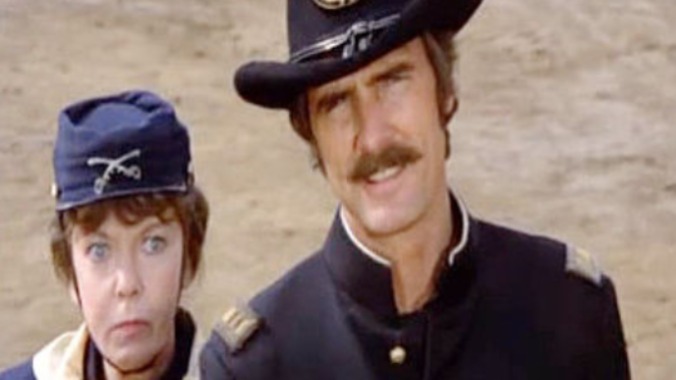Dennis Weaver and Ida Lupino Refused to Phone It in During Female Artillery

From 1969 to 1975, ABC put out weekly films. They functioned as TV pilots, testing grounds for up-and-coming filmmakers, and places for new and old stars to shine. Every month, Chloe Walker revisits one of these movies. This is Movie of the Week (of the Month).
The ABC Movie of the Week favored thriller and horror movies, but the next most populous genre was the Western. Budgetary concerns were undoubtedly a factor (a few horses, a patch of desert—you’re good to go!), and yet considering how much it usually had its finger on the cultural pulse, this was somewhat out of character for the series; theatrically, the golden age of the Western was more than a decade in the rearview mirror, and even the Spaghetti being served up by Clint and Sergio was starting to taste a little stale. Nevertheless, there remained a small but steady stream of classics—McCabe & Mrs. Miller, Two Mules For Sister Sara, Jeremiah Johnson, Buck and the Preacher—hitting the big screens; revisionism and classicism colliding and creating films both traditional and unusual.
That pattern was replicated in the ABC MOTWs. The Silent Gun combined the slot’s love of Lloyd Bridges and its love of message movies into a potent plea for gun control. Alias Smith and Jones and Kung Fu sparked much-loved series. Clint Walker and his almost-comically square jaw made a play for John Wayne’s soon-to-be vacated seat as the macho king of the west in Yuma and The Bounty Man.
On the whole, however, these telefilms were more concerned with women on the range. Mrs. Sundance was a low-key piece imagining Elizabeth Montgomery as the widow of the Sundance Kid. The Devil and Miss Sarah, starring Janice Rule, was a spooky story about possible Satanic possession on the range. Wild Women, Pioneer Woman, The Daughters of Joshua Cabe…although many of the resultant films were still riven with sexism, there appeared a concerted effort to engage the large female viewership with one of the most traditionally male genres.
1973’s Female Artillery—a real contender for the worst-named of all 254 ABC MOTWs—sees rascal with a heart of gold Deke Chambers (Dennis Weaver) join up with a group of widows, led by Martha Lindstrom (Ida Lupino), crossing the plains. Martha knows Deke is hiding something, but she senses a goodness in him and allows him to stay with her group as she works out what his real deal is; subsequently, two of the other women fall in love with him. Meanwhile, a nefarious posse is in hot pursuit of Deke, who has something of theirs that they would very much like back.
Dennis Weaver had been around for 20 years before Female Artillery, starting off as a supporting actor in ‘50s B movies (most notably, Touch of Evil), before a long-running role in seminal western show Gunsmoke confined him largely to the smaller screen. These days, he is probably best known as the weaselly lead of the most famous of all the ABC MOTWs, Steven Spielberg’s feature debut, Duel.
-

-

-

-

-

-

-

-

-

-

-

-

-

-

-

-

-

-

-

-

-

-

-

-

-

-

-

-

-

-

-

-

-

-

-

-

-

-

-

-








































